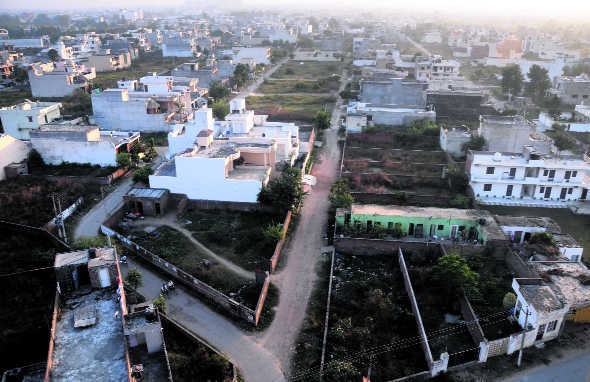
Abdicating its responsibility of arranging housing for people, not monitoring unauthorised growth, and then proposing shady regularisation policies, is not a matter of mere maladministration. It is a deliberate ploy guided by the politician-builder.
Kuljit Bains
The business of land and property is not called ‘real estate’ for nothing. By now, nearly all — rich, middle class, and poor — would have realised that no other estate, whether executive, legislature or judiciary, can rein in this ‘real power’. Even the so-called Fourth Estate makes only a meek presence felt, if not actively participate in the ‘real’ racket that is as old as the history of civilisation.
The state government is preparing to give Cabinet approval to the Punjab Laws (Special Provisions for Regularisation of Unauthorised Colony) Bill, 2018. It may be a good time to recall that over the past two decades, governments came and went, property prices saw boom as much as bust, regularisation policies were framed and changed, investors suffered, home buyers were stuck in hellholes, but no one ever told you not to invest in ‘real estate’. That is because this is perhaps the single largest and quickest route to transfer hard-earned money from the common citizen to the politician-builder, who also is now common.
The 10 years of SAD-BJP rule saw at least three regularisation schemes, which were deemed successful. The measure of success was that a certain number of property buyers (not all) paid up to get their colonies ‘approved’ on paper. What happened on ground was that the builder paid nothing, home buyers paid money, and the government collected copious funds. And that is it. The payers still got no better civic utilities than non-payers. That is because the amount charged was in any case not enough to provide those utilities; and then even that meagre amount was never spent on the purpose as the fund-starved government had other uses for it.
Last year, the Congress government proposed a fairer regularisation policy, which asked builders to pay up, and required certain basic amenities for the buyers. Expectedly, there were no takers for the policy, and the government — approached through people’s elected representatives — dutifully acquiesced to the pressure from builders. Now there may be only a few requirements on developers to fulfil, and home owners may expect little in terms of comforts or utilities. The majority of the Cabinet pitched for this ‘practical solution’; practical because this is the path of least resistance, and most enticement.
Common sense would tell us there cannot be any retrospective ‘planned development’, as these alleged regularisation policies are made out to be. And such has been the focus all along on ‘regularisation’, that there is never a talk of planned future development. Local Bodies Minister Navjot Singh Sidhu claims he has told his staff that there should be no illegal development after March 31. He would know as well as anyone that this is a fond hope. He is not up against mere corruption, but human history of greed.
No new colony has been developed by the government in Ludhiana in two decades, even as 1,400 (officially counted) unauthorised colonies have come up in that period. Essentially, the government is planning for neither growth, nor the existing population. Abdicating its responsibility of arranging housing for people, not monitoring unauthorised growth, and then proposing shady regularisation policies, is not a matter of mere maladministration. It is a deliberate ploy guided by the politician-builder.
The 10 years of SAD-BJP rule saw many politicians turning builders, and top builders turning politicians. Ahead of the 2017 elections, a common refrain was bring Capt Amarinder Singh back, as real estate was said to have always done well under the Congress. Any politician worth his salt has a stake in the property business, formal or informal. In fact, anyone with even a modest amount of money has a stake. One of the reasons is few other opportunities of investment in Punjab. But the returns are uneven — the common investor is meant to lose, and promoters win.
With little real growth to justify the property bubble (yes, the prices are still not real), there is a vested interest to continue blowing air into it. Is anyone out there expecting the regularisation policy to bring relief from choked sewers, empty rooftop water tanks, and blown-out power transformers? Please forget that, and get used to real life.


























